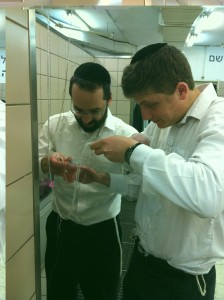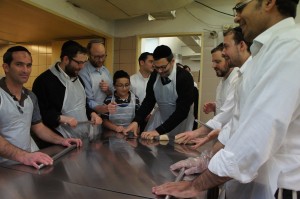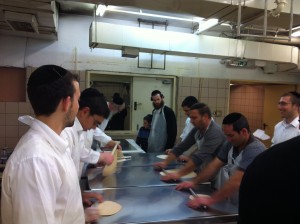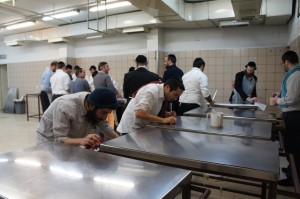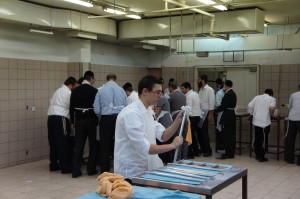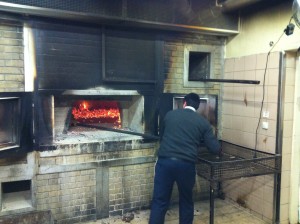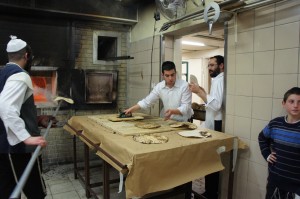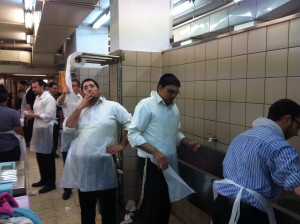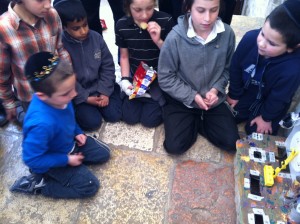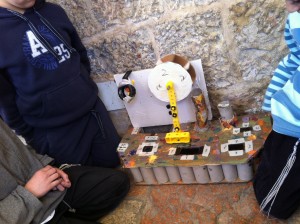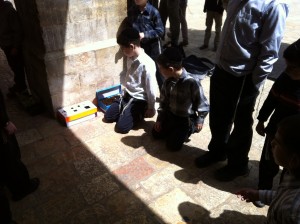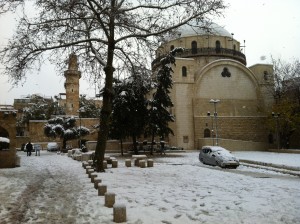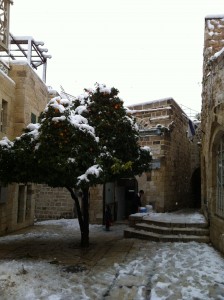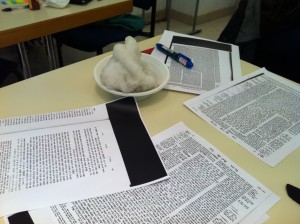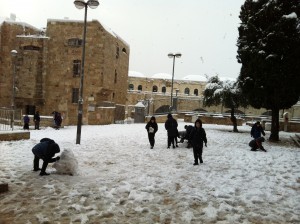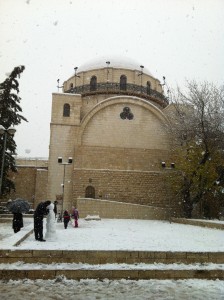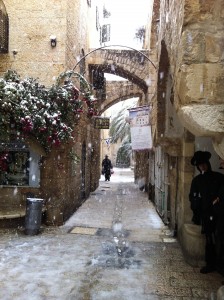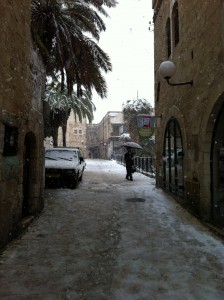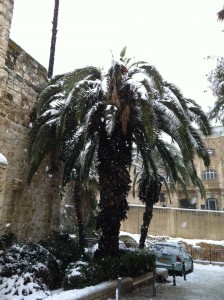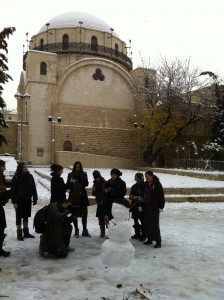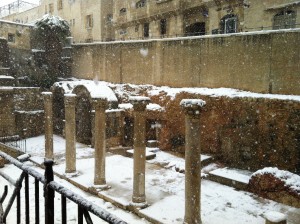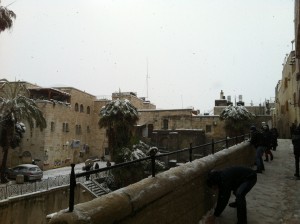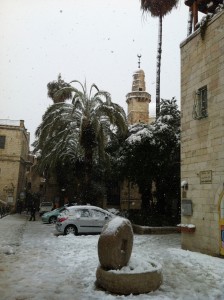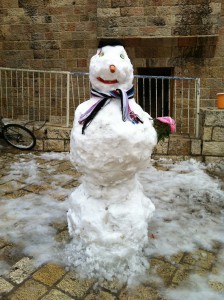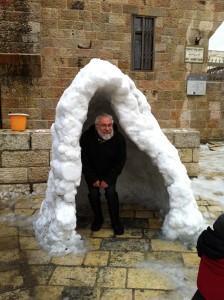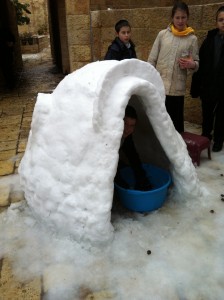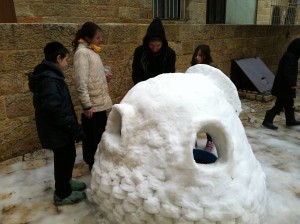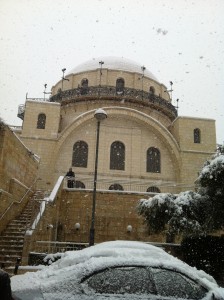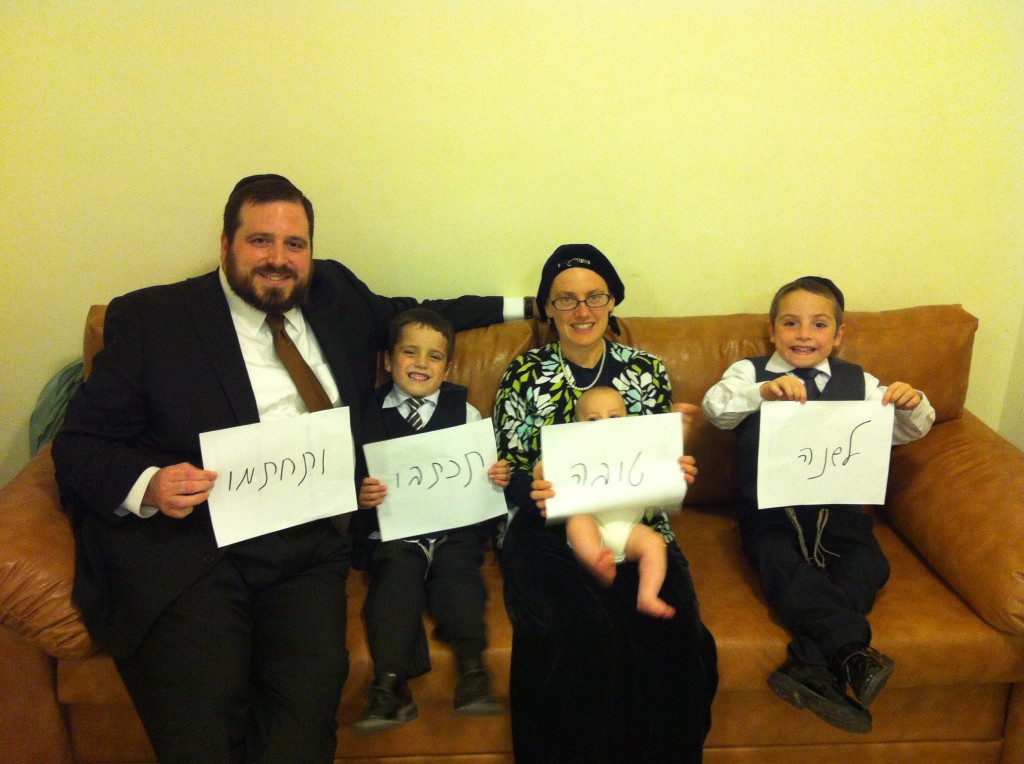
“Please. Send. More. Brisket.”
When it comes to the High Holidays, the common perception is that Rosh Hashanah is fun, while Yom Kippur is the hard one. After all, Yom Kippur is when we fast and repent, spending all day talking about how bad we were last year, begging for forgiveness, and promising that next year will somehow be different. As a kid, I definitely dreaded Yom Kippur. Spending a big chunk of the day in synagogue brought it to another whole level of affliction.
 By contrast, Rosh Hashanah is all apples & honey, warm wishes for a sweet new year, the shofar, much shorter services, and even fish heads. If not for the fact that it is an ominous portent of the Day of Atonement to come just 10 days later, Rosh Hashanah would be just about perfect.
By contrast, Rosh Hashanah is all apples & honey, warm wishes for a sweet new year, the shofar, much shorter services, and even fish heads. If not for the fact that it is an ominous portent of the Day of Atonement to come just 10 days later, Rosh Hashanah would be just about perfect.
But that isn’t quite how it really is. Rosh Hashanah is, in truth, the Yom HaDin – the Day of Judgment. Our fate for the next year is being determined, at least preliminarily. Yes, we’re supposed to be happy and enjoy all of the special observances of the holiday, but we’re also supposed to be in awe of the King and His judgment.
Nonetheless, back home in Chicago, Rosh Hashanah tended to feel more celebratory than trepidatious. Not so here. Much of that is because I’m not just in Jerusalem, but in yeshiva. We’ve been hammering away at teshuvah (repentance – literally, “return”) for all of the Hebrew month of Elul, including careful study of a classic work on the topic (Rabbenu Yonah’s Sha’arei Teshuvah) and formulation of practical exercises to implement the concepts therein. Public speeches by the rabbis of the yeshiva have been teshuvah-focused, and the topic has been hanging heavily in the air since I got here.
Still, Rosh Hashanah itself was at another level of intensity from what I’m used to. Part of it was that the yeshiva davens (prays) vasikin on Rosh Hashanah. Vasikin means that the service is timed to hit the shmoneh esrei exactly at sunrise. To do this, we started a bit after 5:30 a.m. each of the two days. (We’re also going to daven vasikin for Yom Kippur, which is after the time change here in Israel. Looks like a roughly 4:30 a.m. start time.) It seems vasikin is far from unusual on Rosh Hashanah, because there were plenty of people out when I was walking to yeshiva in the morning.
Even aside from vasikin, there was a much stronger flavor of “Yom HaDin.” For example, the speaker before mussaf (the part of the service in which, among other things, the shofar is blown) was Rabbi Krieger, the yeshiva’s Shoel U’Meishiv (a rabbi who is available during the day to answer the students’ questions), who also happens to be a great-nephew of Rabbi Meir Simcha HaKohen, a.k.a. the Ohr Somayach or the Meshech Chochma. He talked about how hard it was to speak at that moment, in light of the impending shofar blowing, and related that Rabbi Isser Zalman Meltzer was once asked to speak in the same slot. According to Rabbi Krieger, Rav Meltzer got up, and promptly began crying uncontrollably. He cried for 10 minutes, and sat down… that was his speech.
Another difference from Chicago is that there is far less uniformity in the community-wide schedule. At home, aside from the occasional vasikin minyan, the various synagogues start and and at similar times. The whole neighborhood seems pretty much on the same rhythm, with people coming & going between home, synagogue, and meals at basically the same time. Here, there is much more variety. Starting and finishing times vary wildly. Even for those who daven vasikin, some (like my yeshiva) do a lot of singing, etc., and so don’t finish until after 11:30 a.m. By contrast, our lunch host also davened vasikin, but his private minyan goes pretty straight through, and they were done hours earlier. Our houseguests went to services at Aish Hatorah, and didn’t get back until 2:00 p.m. Some kabbalists have a shul around the corner from here, and I can only imagine when or how long they davened (a friend of a friend reportedly once went there for evening Shabbos services, but left after it took about 15 minutes for them to say the first line of Krias Shema). And I have no idea what it was like down at the Kotel.
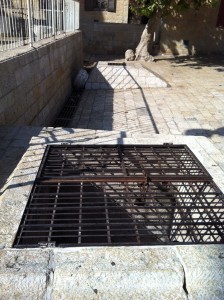
G-d should cast our sins into the depths of the… sewer?
On Rosh Hashanah afternoon, there’s a custom to perform tashlich, a ceremony done next to a body of water. In Chicago, we go to the nearby North Shore Channel of the Chicago River. It’s your classic, preferred venue for tashlich – flowing water, fish swimming happily. There no such open water in Jerusalem, much less in the Old City. So, here, they do tashlich in the square near our apartment… next to two big sewer grates. I guess there might be water down there somewhere, but I sure didn’t see any. Jerusalem usually has it all over Chicago in matters of spiritual ambiance, but the Windy City takes this particular contest going away.
I have to say that, overall, I found myself a little homesick over Rosh Hashanah, pretty much for the first time since we got here. On the High Holidays, you’re kind of going to battle spiritually. I missed not only the familiar surroundings of my synagogue, and our star chazzan, but especially the tight bond among the mispallelim (those praying). We’re not a kehilla (congregation) of convenience, but one of choice, with similar goals and strong friendships. There’s a bond among the people in yeshiva, for sure, but I’ve only been here a month. Also, most of the guys here are significantly younger. In all, it feels weird to be going to war without my platoon.
Adding to the weirdness of this Rosh Hashanah was the stomach bug that went through the family. My turn came just after mincha (the afternoon service) on the first day, which put me in bed until I made it to synagogue early the next morning. Both Yitzi and Shalom had it pretty bad, but Mordechai, thank G-d, avoided it entirely. Debbie got it the worst by far, but I’ll let her tell her tale when she’s ready.
Even with the sickness, of the stomach and home- variety, Rosh Hashanah here was an amazing experience. People talk about the kedushah (holiness) of Eretz Yisrael (the Land of Israel), of Jerusalem, and of the Old City, but it doesn’t hit you over the head like a sledgehammer – at least it didn’t for me. Instead, it is like a quiet background hum that slowly grows in intensity over time. By the time of Rosh Hashanah, I could feel its momentum, and it was part of what made this an intense experience. We’ll see how it feels as our year progresses…
Wishing everyone a g’mar chasima tova and an easy, meaningful fast.
Like this:
Like Loading...
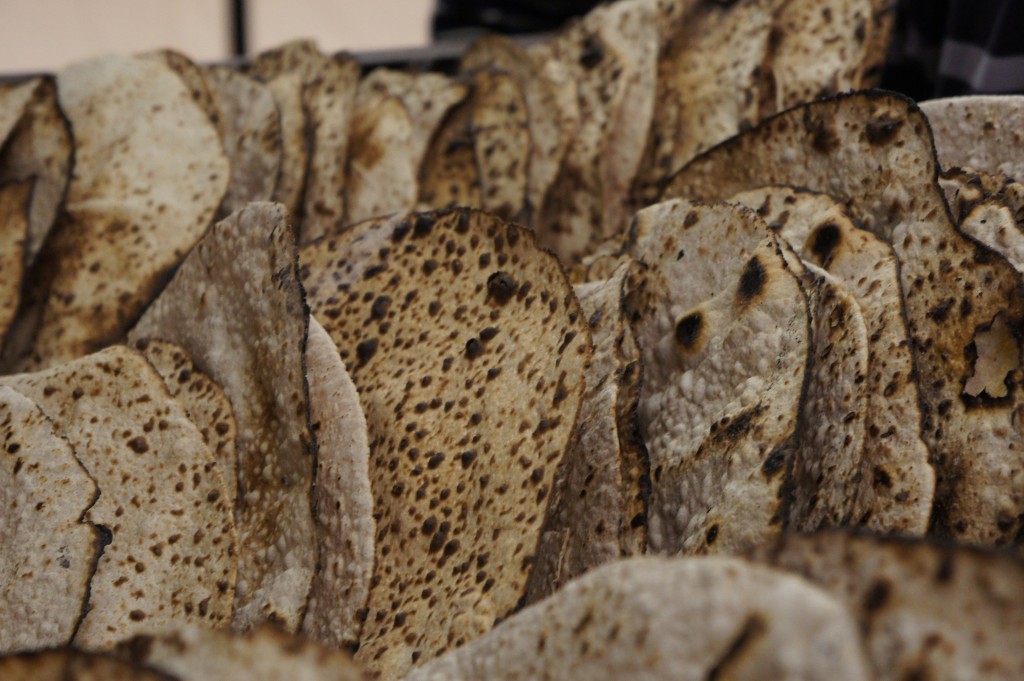 I’m not a lazy blogger – I’m abating the tendency of blogs to push media into hyper-speed. I’m giving time to allow events to be put in historical perspective. I am a pioneer. A hero.
I’m not a lazy blogger – I’m abating the tendency of blogs to push media into hyper-speed. I’m giving time to allow events to be put in historical perspective. I am a pioneer. A hero.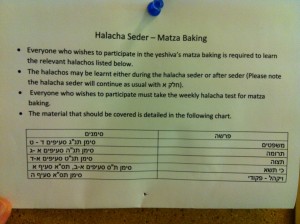 The yeshivah organized a group trip to bake handmade matzah together, at the bakery in the basement of the massive Belz synagogue. In order to go, you had to take time in the prior weeks learning (and being tested on) selected halachos (laws) of making matzah. The law in this area is very detailed, and is primarily designed to ensure that the matzah definitely contains no chametz. The precautions taken to prevent it from leavening include taking no more than 18 minutes from the time the flour is mixed with water until the matzah is finished; constantly working the dough (kneading it, rolling it, etc.) before baking; rolling it very thin; and cooking in an extremely-hot, wood-fired oven.
The yeshivah organized a group trip to bake handmade matzah together, at the bakery in the basement of the massive Belz synagogue. In order to go, you had to take time in the prior weeks learning (and being tested on) selected halachos (laws) of making matzah. The law in this area is very detailed, and is primarily designed to ensure that the matzah definitely contains no chametz. The precautions taken to prevent it from leavening include taking no more than 18 minutes from the time the flour is mixed with water until the matzah is finished; constantly working the dough (kneading it, rolling it, etc.) before baking; rolling it very thin; and cooking in an extremely-hot, wood-fired oven.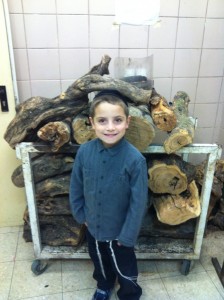 I brought Yitzi along for the experience, and he was thrilled. I didn’t actually see much of him, though, at the bakery because I had the boring job of working the dough while waiting for the rollers to be ready to start on it. He spent most of his time by the oven, which also included getting to sample the matzos that were invalidated for use on Pesach for one reason or another.
I brought Yitzi along for the experience, and he was thrilled. I didn’t actually see much of him, though, at the bakery because I had the boring job of working the dough while waiting for the rollers to be ready to start on it. He spent most of his time by the oven, which also included getting to sample the matzos that were invalidated for use on Pesach for one reason or another.
